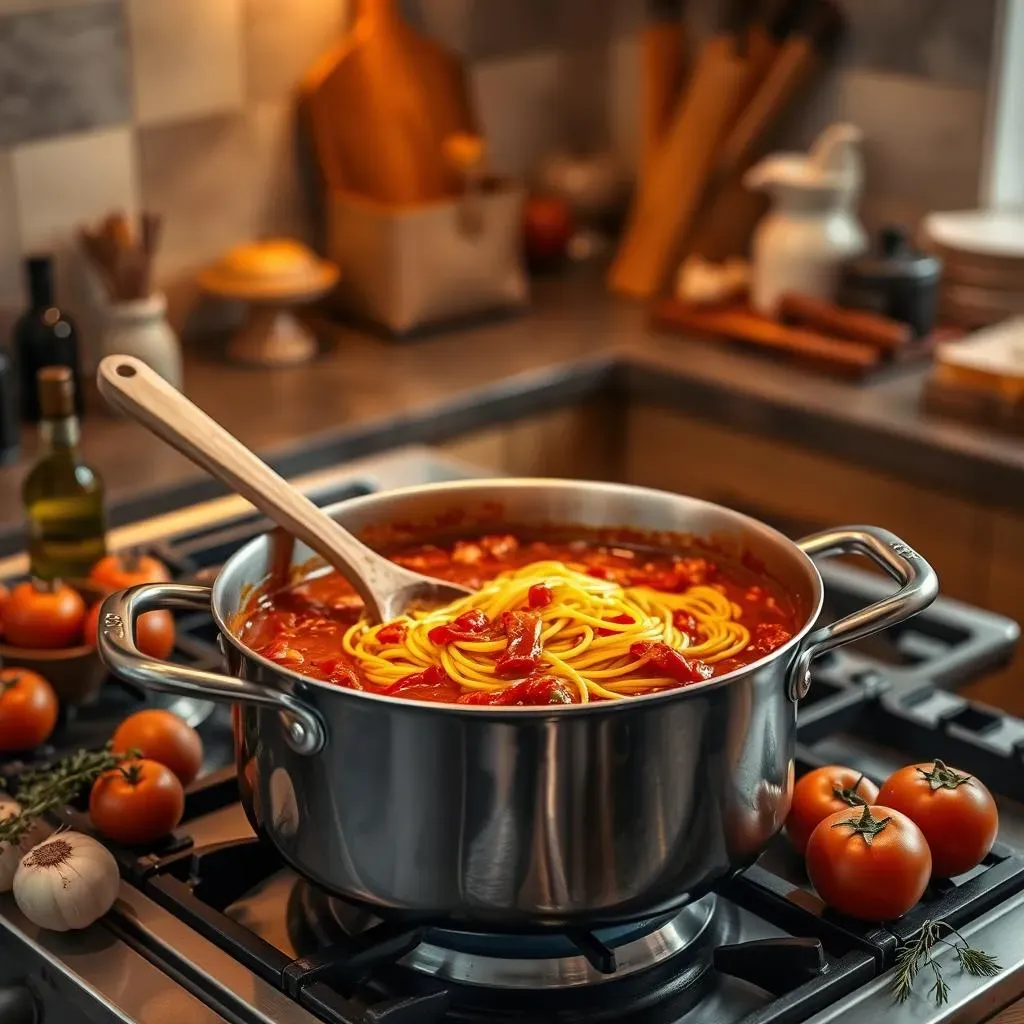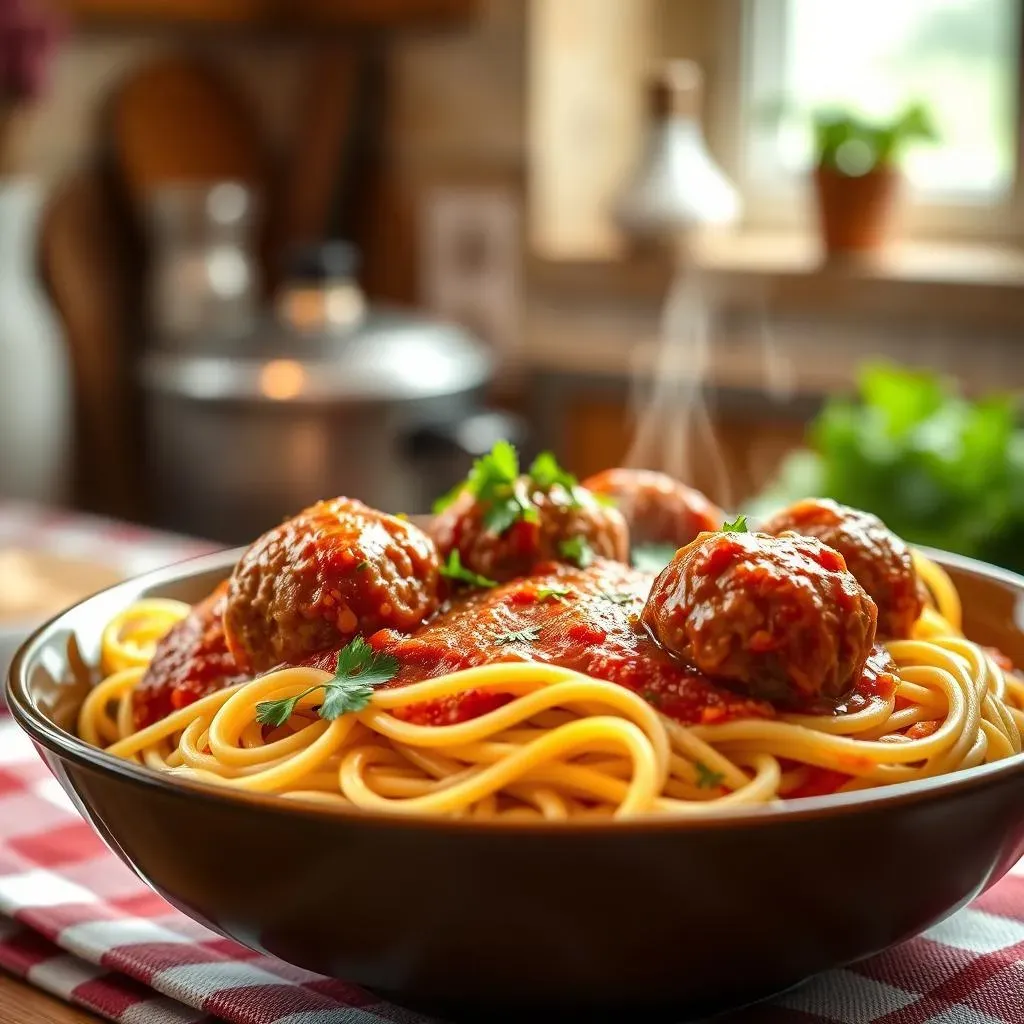Who doesn't love a steaming plate of spaghetti and meatballs? It's a classic comfort food that transcends generations. But for those keeping kosher, enjoying this Italian-American staple can present a challenge. Fear not! This isn't just another recipe; it's your comprehensive guide to creating truly delicious kosher spaghetti and meatballs, adhering to Jewish dietary laws without sacrificing any of the flavor. We'll break down everything from understanding the kosher rules that apply, to selecting the right ingredients and mastering the cooking techniques that will make your dish a family favorite. Forget bland and boring – get ready to discover the secret to a rich, flavorful sauce, perfectly seasoned meatballs, and a satisfying meal that everyone will rave about. So, grab your apron, and let's get cooking! We'll explore each element, ensuring your kosher spaghetti and meatballs are a culinary success.
What Makes Spaghetti and Meatballs Kosher? Understanding the Rules

What Makes Spaghetti and Meatballs Kosher? Understanding the Rules
The Basics of Kosher
So, what exactly does "kosher" mean when it comes to food? It all boils down to a set of dietary laws rooted in the Torah, the Jewish bible. These laws dictate what types of food can be eaten, how they must be prepared, and, crucially, which foods can and cannot be eaten together. When we're talking about kosher spaghetti and meatballs, we're primarily concerned with two major rules: the separation of meat and dairy, and the use of kosher-certified ingredients.
Keeping kosher isn't just about following a list of rules; it's about connecting to a tradition that spans thousands of years. For many, it's a way to bring mindfulness and intention to the act of eating. It might seem complicated at first, but once you understand the core principles, it becomes much easier to navigate. Think of it like learning a new language – it takes practice, but the rewards are well worth the effort!
No Mixing Meat and Dairy
This is the big one! The prohibition against mixing meat and dairy is a cornerstone of kosher law. This means that you can't have any dairy ingredients in your meatballs or your sauce. That creamy Parmesan you were planning to grate on top? Sadly, a no-go. This restriction also extends to the cooking process. You need to use separate pots, pans, and utensils for meat and dairy. Some kosher homes even have separate dishwashers! It might sound extreme, but it's all about maintaining the separation.
So, how does this impact our spaghetti and meatballs? It means we need to be extra careful about what we put in our sauce and meatballs. We'll be swapping out dairy-based ingredients for kosher-friendly alternatives. Trust me, you won't even miss the cheese!
Ingredient | Kosher Substitute |
|---|---|
Parmesan Cheese | Nutritional Yeast (for a cheesy flavor) |
Butter | Olive Oil or Kosher Margarine |
Kosher-Certified Ingredients: Ensuring Compliance
Beyond the meat and dairy issue, all your ingredients need to be kosher-certified. This means that a kosher certifying agency has verified that the ingredients and the production process meet kosher standards. Look for a kosher symbol (like a "U" or "K" inside a circle) on the packaging. This symbol assures you that the product is indeed kosher. This applies to everything from your ground meat to your canned tomatoes to your spaghetti itself.
Navigating the world of kosher certification can feel like deciphering a secret code, but don't worry, it gets easier with practice. There are numerous kosher agencies, each with its own symbol. A quick search online can help you identify what the different symbols mean. And remember, when in doubt, it's always best to choose products with a clear kosher certification.
Crafting the Perfect Kosher Meatballs: Ingredients and Techniques

Crafting the Perfect Kosher Meatballs: Ingredients and Techniques
Choosing the Right Meat and Binders
let's talk meatballs! The foundation of any great meatball is, well, the meat! For kosher meatballs, you'll typically use ground beef – chuck is a good option because it has a decent fat content, which keeps the meatballs moist. You can also use a mix of ground beef and ground lamb for a richer flavor. Just make sure the meat is certified kosher! Now, what about binders? Breadcrumbs are essential for holding everything together. Use kosher-for-Passover breadcrumbs if you want to be extra careful, or make your own from kosher bread. Eggs are another key binder, adding moisture and richness.
The key to a tender meatball is not overworking the mixture. Mix everything gently until just combined. Overmixing develops the gluten in the breadcrumbs, resulting in tough meatballs. Nobody wants that!
Seasoning and Flavor Secrets
This is where you can really get creative! Don't be shy with the seasonings. Start with the basics: salt, pepper, garlic powder, and onion powder. Then, add some Italian flair with dried oregano, basil, and parsley. A pinch of red pepper flakes can add a subtle kick. Some people like to add a bit of grated onion or minced garlic for extra flavor, but be careful not to add too much, as it can make the meatballs too wet. Another trick is to add a tablespoon or two of tomato paste to the meat mixture – it adds a depth of flavor and helps to bind the meatballs.
Remember, taste as you go! Before you start forming the meatballs, cook a tiny bit of the mixture in a pan to check the seasoning. Adjust as needed. And don't be afraid to experiment! Try adding different herbs and spices to create your own signature meatball flavor.
The Secret to a Rich and Flavorful Kosher Spaghetti Sauce

The Secret to a Rich and Flavorful Kosher Spaghetti Sauce
Alright, let's talk sauce. This is where the magic truly happens. A great kosher spaghetti sauce starts with a good base – crushed tomatoes are your best friend here. San Marzano tomatoes are the gold standard, but any good quality crushed tomatoes will do. Don't skimp on the olive oil! It adds richness and flavor. Sauté some diced onions and minced garlic in the olive oil until they're soft and fragrant. This is the foundation upon which your sauce will be built. Now, for the secret ingredient… a touch of sugar! It balances the acidity of the tomatoes and adds a subtle sweetness. Trust me, it makes all the difference. And of course, don't forget the herbs – dried oregano, basil, and a bay leaf are essential. Simmer that sauce low and slow for at least an hour, or even longer if you have the time. The longer it simmers, the more the flavors will meld together and deepen.
Bringing It All Together: Cooking Kosher Spaghetti and Meatballs

Bringing It All Together: Cooking Kosher Spaghetti and Meatballs
From Simmer to Serve: Combining the Elements
Alright, the moment we've been waiting for! Your sauce is simmering, your meatballs are ready to go – it's time to bring it all together. Gently drop the meatballs into the simmering sauce. Make sure they're submerged, and let them cook for at least an hour, or even longer. The longer they simmer, the more flavorful they'll become. Stir occasionally to prevent sticking, and be careful not to break the meatballs. While the meatballs are simmering, cook your spaghetti according to the package directions. Don't overcook it – you want it to be al dente, with a slight bite. Once the spaghetti is cooked, drain it well and add it to the sauce. Toss to coat, and let it simmer for a few more minutes to allow the flavors to meld together.
Now, for a little secret that my grandma taught me: reserve about a cup of the pasta water before you drain the spaghetti. Add a little bit of the starchy water to the sauce if it seems too thick. It helps to create a silky, emulsified sauce that clings beautifully to the spaghetti. This is a pro tip that will take your spaghetti and meatballs to the next level!
Plating and Garnishing: The Final Touch
Presentation matters! Serve your kosher spaghetti and meatballs in a large bowl or on individual plates. Garnish with a sprinkle of fresh parsley or basil for a pop of color and freshness. A drizzle of good quality olive oil is always a welcome addition. And if you want to get really fancy, you can add a dollop of kosher ricotta cheese (if you're not serving it with meat, of course!). Serve with a side of crusty bread for soaking up all that delicious sauce. And there you have it – a comforting, flavorful, and completely kosher spaghetti and meatballs that will impress your family and friends.
Remember, cooking is all about experimentation and having fun. Don't be afraid to tweak the recipe to your liking. Add more garlic if you're a garlic lover, or a pinch of red pepper flakes if you like a little heat. The most important thing is to enjoy the process and create a meal that you and your loved ones will savor. Bon appétit, or as we say in Yiddish, "Ess gezunterheyt!" (Eat in good health!).
Serving Suggestions and Variations for Kosher Spaghetti and Meatballs

Serving Suggestions and Variations for Kosher Spaghetti and Meatballs
Elevating the Experience: Serving Suggestions
so you've nailed the kosher spaghetti and meatballs. Now, let's talk about how to serve it up in style! First off, presentation is key. A simple garnish of fresh basil or parsley can really elevate the dish. Serve it family-style in a big, beautiful bowl, or plate it individually for a more formal setting. Don't forget the sides! A crisp green salad with a light vinaigrette is a perfect complement to the richness of the pasta. And of course, you'll want some crusty bread for soaking up all that delicious sauce. For a truly authentic Italian-American experience, serve it with a side of roasted vegetables like zucchini, bell peppers, and onions. And if you're feeling fancy, a sprinkle of nutritional yeast can add a cheesy flavor without breaking the kosher rules.
Think about the overall dining experience. Set the table with nice linens, light some candles, and put on some Italian music. It's all about creating a warm and inviting atmosphere where your guests can relax and enjoy the meal. And don't forget the drinks! A simple glass of sparkling water with a lemon wedge is a refreshing choice, or you could opt for a kosher-certified Italian soda. For the adults, a glass of kosher red wine pairs perfectly with the tomato sauce. Remember, it's the little details that make a meal truly special.
Kosher Spaghetti and Meatballs: Variations to Explore
Want to mix things up a bit? There are tons of ways to put your own spin on this classic dish while still keeping it kosher! One easy variation is to swap out the spaghetti for zucchini noodles (zoodles) for a lighter, healthier option. You can also experiment with different types of ground meat. Ground turkey or chicken can be used instead of beef, or you can try a combination of different meats for a more complex flavor. For a vegetarian twist, try using lentil or mushroom-based meatballs. And don't be afraid to get creative with the sauce! Add some roasted red peppers, olives, or capers for a Mediterranean-inspired flavor. Or try a spicy arrabbiata sauce with a pinch of red pepper flakes.
- Spice it Up: Add a pinch of red pepper flakes to the sauce for a kick.
- Veggie Boost: Incorporate finely chopped vegetables like carrots, celery, and zucchini into the meatball mixture.
- Herb Infusion: Experiment with different fresh herbs like rosemary, thyme, or sage in the meatballs or sauce.
Another fun variation is to make mini meatballs and serve them as appetizers. Thread them onto skewers with cherry tomatoes and basil leaves for a festive presentation. Or try baking the meatballs instead of simmering them in the sauce for a slightly different texture. The possibilities are endless! The most important thing is to have fun and experiment until you find a combination that you love.
Accompaniments and Pairings
What you serve alongside your kosher spaghetti and meatballs can really enhance the meal. A classic Caesar salad (hold the Parmesan, of course!) is a refreshing counterpoint to the richness of the pasta. Roasted vegetables like asparagus, broccoli, or Brussels sprouts are also great choices. For a more substantial side dish, try a simple potato kugel or a quinoa salad with roasted vegetables. And don't forget the bread! A warm loaf of challah or a crusty baguette is perfect for soaking up all that delicious sauce.
Dish | Pairing Notes |
|---|---|
Caesar Salad (Kosher Version) | Provides a crisp and refreshing contrast. |
Roasted Vegetables | Adds a healthy and flavorful side. |
Challah Bread | Perfect for soaking up the sauce. |
When it comes to drinks, a simple glass of sparkling water with a lemon wedge is always a good choice. For a more festive occasion, try a kosher-certified sparkling wine or a homemade lemonade. And for the adults, a glass of kosher red wine, such as a Cabernet Sauvignon or a Merlot, pairs beautifully with the tomato sauce. Remember, the goal is to create a well-rounded meal that is both delicious and satisfying. So, don't be afraid to experiment with different combinations until you find your perfect pairing!
Conclusion: Your Kosher Spaghetti and Meatballs Masterpiece
Creating delicious kosher spaghetti and meatballs is absolutely achievable with the right knowledge and a little practice. From understanding the nuances of kosher meat and dairy separation to mastering the art of a flavorful, meat-based sauce, you now have the tools to impress your family and friends. Don't be afraid to experiment with variations, adding your own personal touch to this classic dish. The most important ingredient, after all, is the love and care you put into preparing it. So go ahead, whip up a batch, and enjoy the satisfaction of a home-cooked meal that's both delicious and kosher!